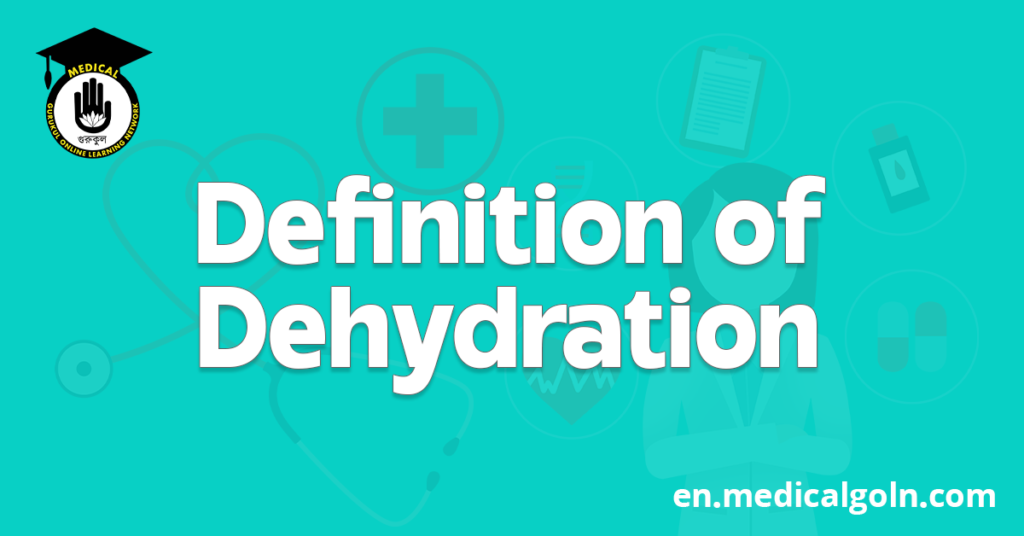Today is our topic of discussion Definition of Dehydration
Definition of Dehydration
Definition:
Dehydration is the state of negative fluid balance that may result from variety of causes. Diarrheal illnesses are the most common causes of dehydration.
Mechanism of dehydration:
Excess water and electrolytes (sodium, chloride, potassium and bicarbonate) are lost through liquid stools, vomits etc. Dehydration occurs when these losses are not replaced.
Management of diarrhoea:
History:
1. Feeding history (in case of child)
2. Diarrhoea: Frequency, consistency, duration, blood in stools, presence of fever
3. Local reports of cholera outbreak
4. Recent antibiotic or other drug treatment (antibiotic- associated diarrhoea)
5. H/o recent measles (in case of child) or other illness
Examination:
1. Signs of dehydration (table below)
2. Signs of severe malnutrition (in case of child)
3. Abdominal distension
Treatment:
Correction of dehydration:
If ‘no signs of dehydration’ –
Treat diarrhoea at home (home treatment of diarrhoea).
a. ORS solution after each stool.
– Up to 2 years – 50 to 100 ml (10 to 20 TSF or 1/4 cup to 1/2 cup)
– 2 years to 10 years -100 to 200 ml (20 to 40 TSF or 1/2 cup to 1 cup)
– Age more than 10 years – as much as they want.) 10 mm
b. Referral knowledge or ‘when to return’:
– becomes more sick or develop high purging rate or repeated vomiting
-eating or drinking poorly
-develops fever
-shows blood in the stool
– not get better within three days
c. Advice how to prepare and feed ORSk
If ‘some dehydration’
– Treat diarrhoea at ORT corner.
a. ORS within 4 hours – 75 ml/Kg irrespective of age. If the patient wants more ORS, give more.
b. After 4 hours:
– Reassess and classify for dehydration. If improves to ‘no sign’ of dehydration’, treat accordingly. -If remains same, repeat the treatment of some dehydration.
If severe dehydration –
a. IV fluid – Cholera saline (or Hartmann’s solution)
b. If the patient can drink, give ORS by mouth while the drip is set up:
c. Again assess, if no improvement (or radial pulse still undetectable) give another same course. If improve, then treat according to ‘some dehydration’.
Drug treatment (any one):
a. Oral Ciprofloxacin 500-750 mg bid (or 15 mg/Kg body wt. bid in children)
b. Oral Azithromycin 1 gm as a single dose in adult
c. Inj. Ceftriaxone 1-2 gm daily as a single dose or in two divided doses (or 25-50 mg/Kg body wt. once daily or bd in children)
d. Oral Erythromycin 1-2 gm daily in 2-4 divided doses. gool set ne iupol beslu
e. Oral Amoxicillin 500 mg TDS in adult (40 mg/Kg/day in divided doses TDS in children)
f. Oral Metronidazole 400 mg tid for 5 days (if suspected giardiasis) in adult.
Zinc supplement:
10-20 mg bid for 10 days. da
Prevention and control:
See above ‘control of diarrhoeal diseases’
Composition of ‘Cholera Saline’:
1. Na (3 gm/L; 133 mEq/L)
2. CI (3.5 gm/L; 98, mEq/L)
3. K (0.5 gm/L; 13 mEq/L) 4. Acetate (2.8 gm/L; 48 mEq/L
See also :

